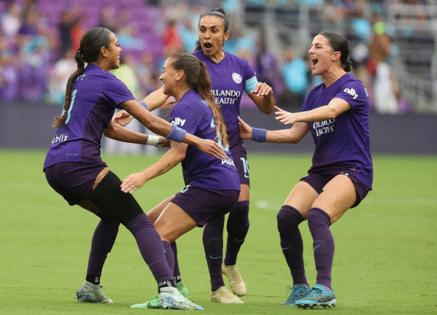Mike Bianchi: Orlando's Grant Hill takes great Pride in his women's soccer investment
Published in Soccer
ORLANDO, Fla. — Grant Hill, the former Orlando Magic star and one of our city’s resident sports icons, started going to Orlando Pride games six or seven years ago because he wanted his daughter and her friends to have athletic role models who they could up look to, emulate and aspire to be someday.
And then Hill and his wife Tamia, the renowned R&B singer, became bigger fans of the Pride than the kids themselves. They fell in love with the product and the players and they became season ticket holders, then suite holders and now they are part of the ownership group.
In other words, the Hills have gone from supporting the team as fans to investing in it as entrepreneurs. And if you know Grant Hill, you know he’s not just going to put his money into something on a whim. He and Tamia are co-owners of the NBA’s Atlanta Hawks and have significant real estate development investments as well. Hill, an Orlando resident, is one of many who believes women’s athletics is the next great frontier of the sports investment industry.
“I think we’ve passed that inflection point where people are starting to look at women’s sports, in particular the NWSL and obviously the WNBA, as businesses that are profitable or will be profitable,” Hill said earlier this week as his Pride prepared to host Sunday’s NWSL playoff semifinal against the Kansas City Current.
Says Pride GM Haley Carter: “Women’s sports is no longer a charitable cause or a philanthropic effort; it’s a business model where stakeholders are looking at ROI [Return On Investment].”
You not only have real ownership buying into women’s sports leagues; they are pouring money into them. The Wilf Family, majority owners of Orlando City and the Pride, are multi-billionaires who also own the NFL’s Minnesota Vikings. The billionaire DeVos Family, who own the Orlando Magic, also are part of the soccer ownership group in Orlando.
Everywhere you look, it seems, corporate movers and shakers and celebrities alike are flocking to invest in women’s sports. In the NWSL alone you have celebrity owners such as Magic Johnson, Serena Williams, Patrick Mahomes, Eva Longoria, etc. In the WNBA, because of the Caitlin Clark effect, the list of investors and corporate sponsorships are growing at an even more rapid rate.
Serious sports ownership groups realize that you have to invest in the product if you want it to grow, and that’s exactly what the Wilfs have done with the Pride. When NWSL rival Bay FC paid $788,000 — the largest transfer fee in women’s soccer history — to acquire superstar Racheal Kundananji during the offseason, Carter told the Wilfs: “We can do the same thing.”
Carter then began the process of orchestrating the complicated acquisition of Barbra Banda, the young Zambian superstar, from the Chinese Women’s Super League club Shanghai Shengli FC. The Pride called an emergency board meeting and Carter told the ownership group it would take $740,000 — the second-highest transfer fee in women’s soccer history — to get Banda to Orlando.
Pride Chairman Mark Wilf told Carter at the meeting, “If you think you can get this done then let’s do it. It’s worth the investment.”
Banda has been one of the most dominant players in NWSL. Even though she didn’t arrive until five games into the season, she finished second in the league in goals scored with 13 and had a brace (two goals) in the Pride’s 4-1 playoff-opening win over Chicago.
“I think Barbra is an indicator of the investment we’re going to see in the women’s game moving forward,” Carter says.
And why not?
It used to be cool for many of the testosterone-charged neanderthal male sports fans/owners to ignore women’s sports, but now it’s become all the rage to watch them, root for them, enjoy them — and invest in them.
A case could be made that women’s sports have become more captivating than their male counterparts. Maybe it’s because female athletes have historically had to fight for recognition, funding and media coverage and that struggle has made them more appreciative and accessible to the fans and media and given them an underdog quality that resonates with all of us.
Or maybe it’s because women’s sports seem to have a greater sense of camaraderie and sportsmanship and emphasize strategy and teamwork over sheer strength and brute force. Even the legendary John Wooden, the greatest men’s college basketball coach of all time, said before he died that, “To me, the best pure basketball I see today is among the better women’s teams.”
“Women’s sports are on this incredible trajectory,” Hill says. “You’re seeing it in owners who have operated professional teams at the highest level starting to believe in the product. You’re seeing it in the television ratings and media partners who are starting to understand that people are watching and paying attention. It’s refreshing, it’s encouraging and, really, it’s about damn time.”
Two decades ago, Grant Hill was the face of Orlando’s NBA team, but now he’s betting on a different kind of magic:
The magic of women athletes and their power to inspire a whole new generation of sports fans.
©2024 Orlando Sentinel. Visit orlandosentinel.com. Distributed by Tribune Content Agency, LLC.







Comments